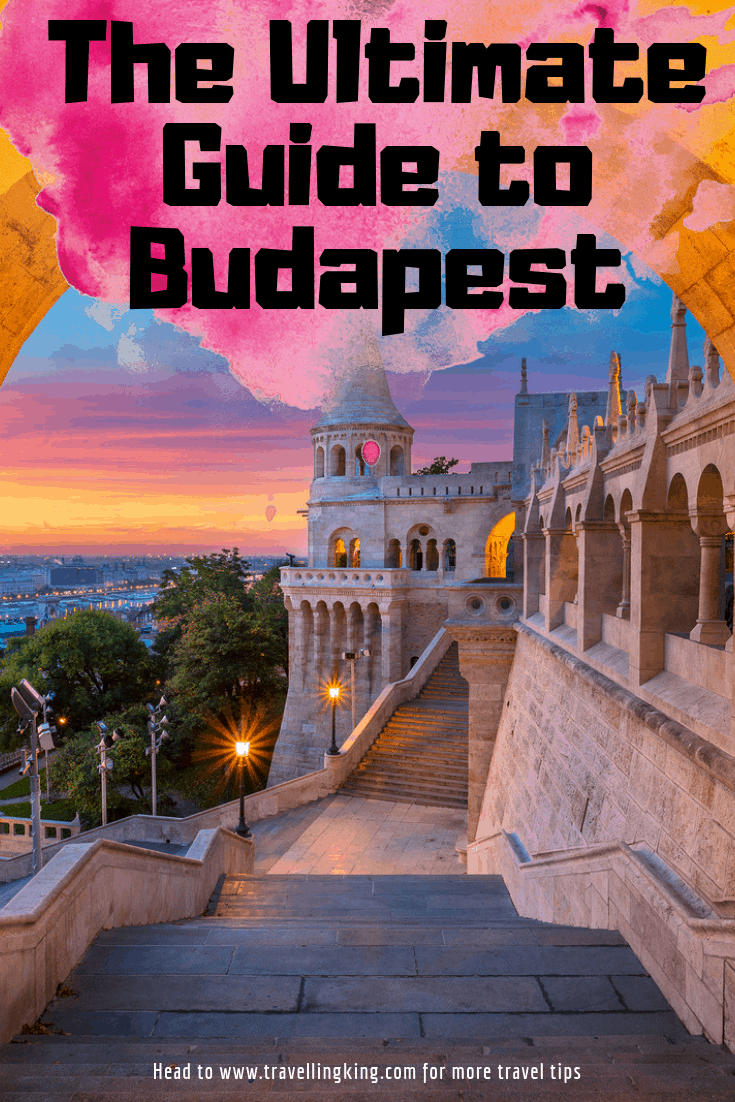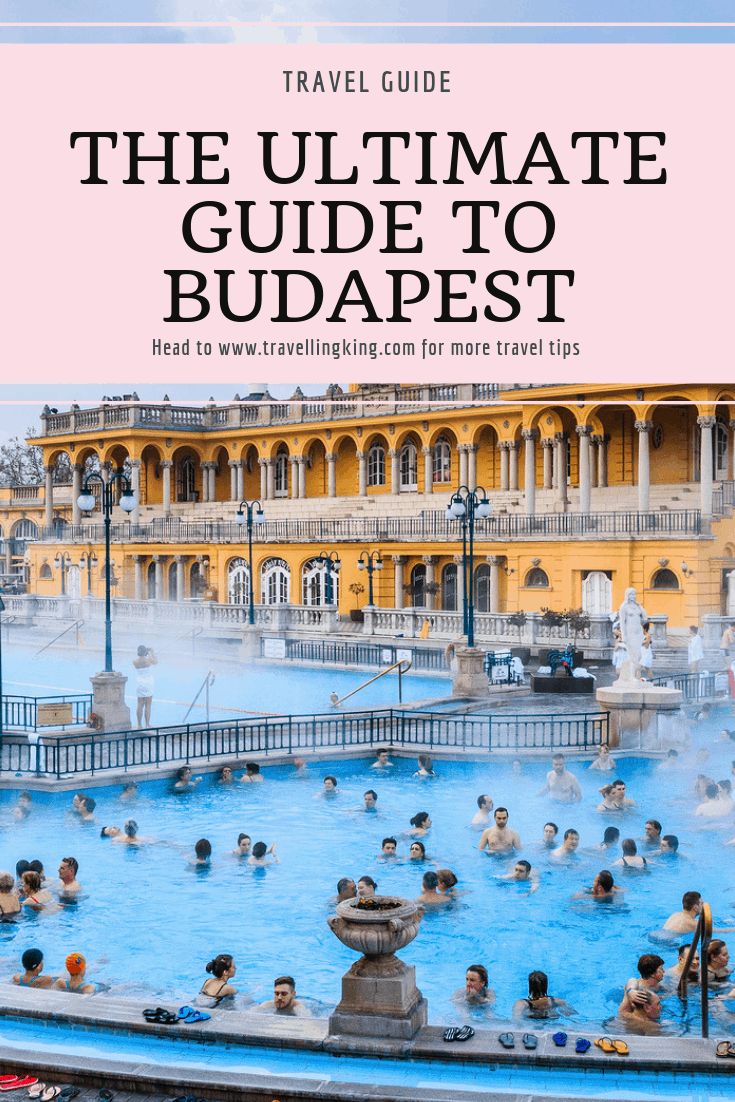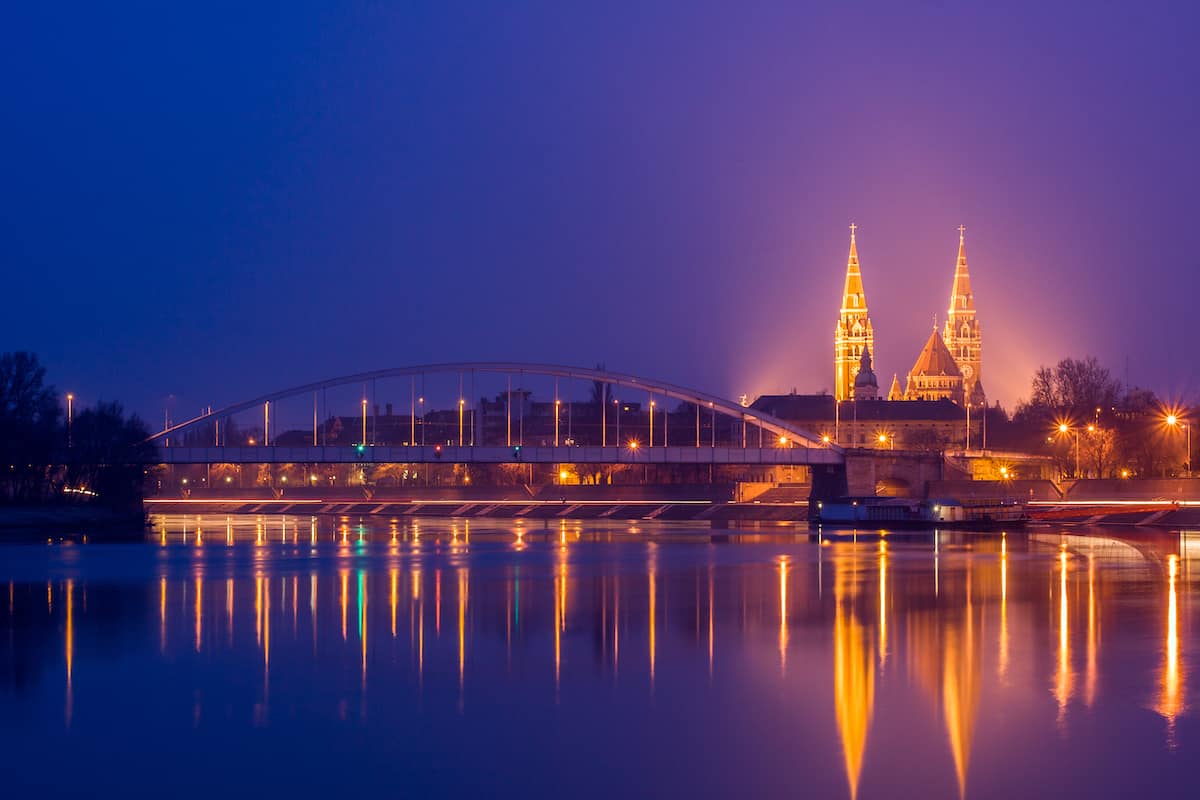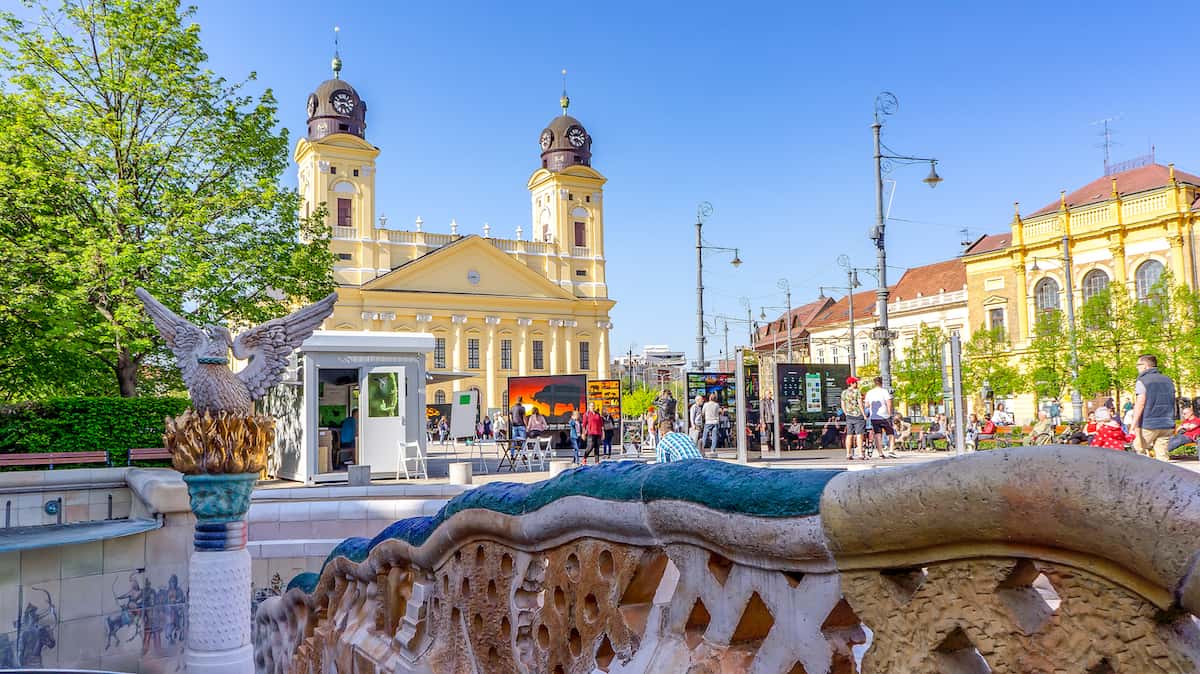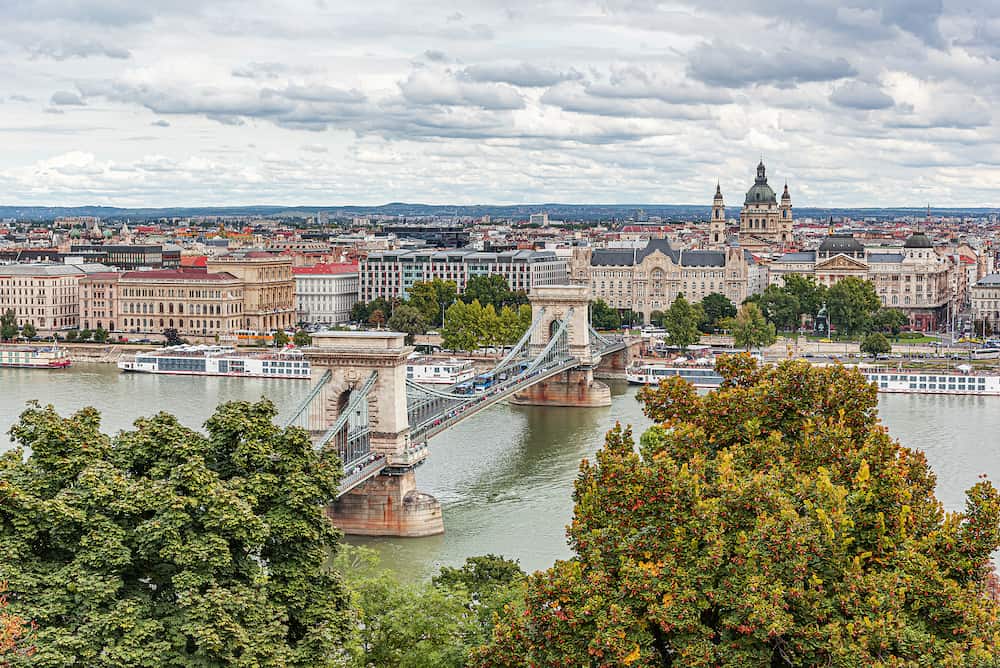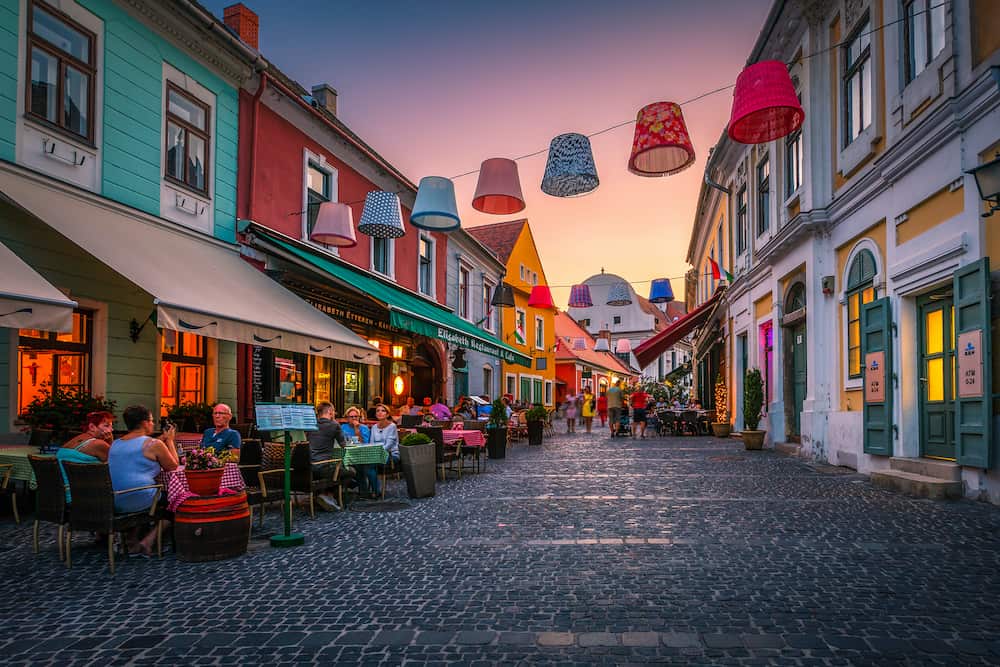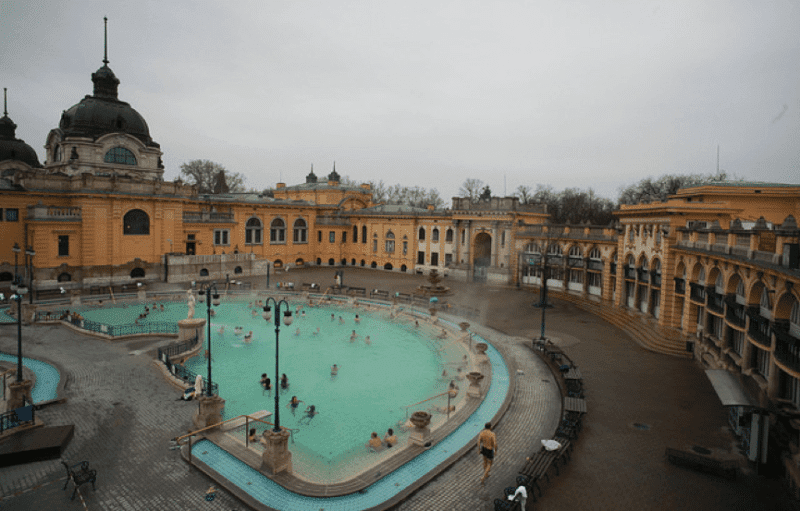The Ultimate Guide to Budapest
Budapest is the beautiful cultural capital of Hungary. It’s a lively, budget-friendly city that combines the very best parts of Central Europe. Whether you’re seeking fascinating, dreamy architecture or wild, enjoyable nightlife, Budapest has it all.
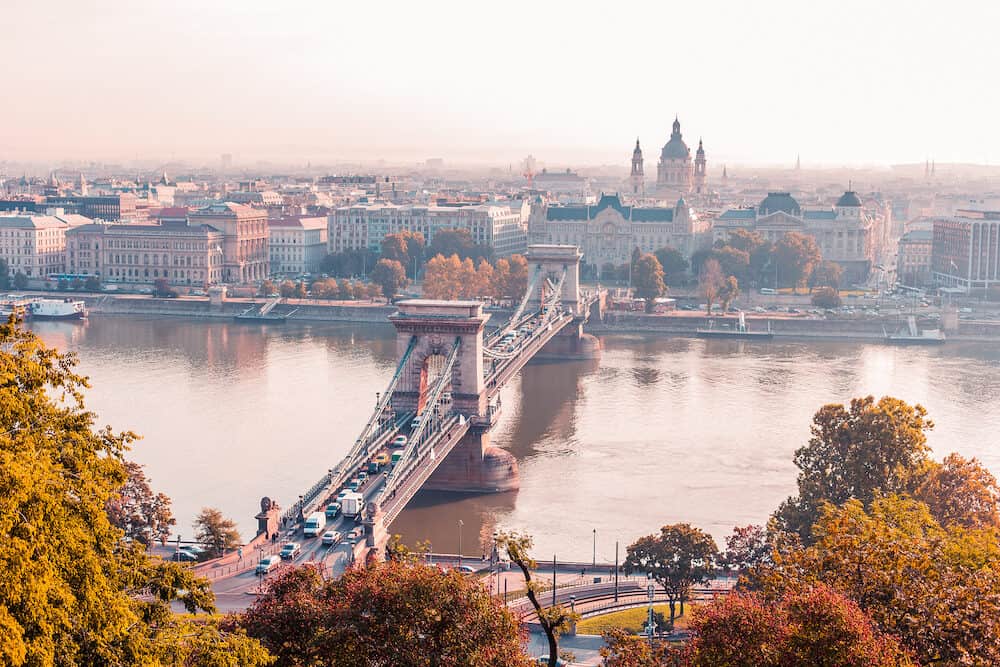
With a growing urban economy and extraordinary historical monuments, Budapest is regarded as one of the best cities in Europe. Not only do Hungarians love the city, but international travellers do too. It’s one of the fastest growing tourist destinations in Europe, with the number of visitors increasing year after year.
Eager to explore Budapest for yourself? This guide will give you an insight into what you can expect when visiting the city, including the top attractions and must-try Hungarian foods.
Plan your trip
Save on fees abroad with the Wise Card—use it at ATMs, restaurants, and for flights or hotels in over 150 countries. Manage 40+ currencies in real-time with the Wise app.
Need Help Planning?
- Cheap Flights: Find the best deals.
- Accommodation: From hostels to luxury stays.
- Car Rental: Affordable options worldwide.
- Sightseeing Tours: Explore without breaking the bank.
- Travel Adapter: One adapter for all your needs.
- Travel Insurance: Don’t risk it—stay covered.
This post includes affiliate links. Read my full disclosure and content policy.
How to get to Budapest
There are plenty of ways to get to Budapest from every European city. You’ll likely be flying into Budapest Ferenc Liszt International Airport (BUD), southeast of the city centre. Bus 100E will take you to the heart of Budapest in around 35 minutes.
The bus departs from the airport every 30 minutes, with the ride costing the equivalent of 3 euros. It’s not worth taking a private taxi, as it takes the same amount of time as the bus yet is significantly more expensive.
There are three international railway stations, so it’s easy to catch a train if you’re already in a neighbouring country. Trains to Budapest from Vienna, Austria and Bratislava, Slovakia both take under three hours.
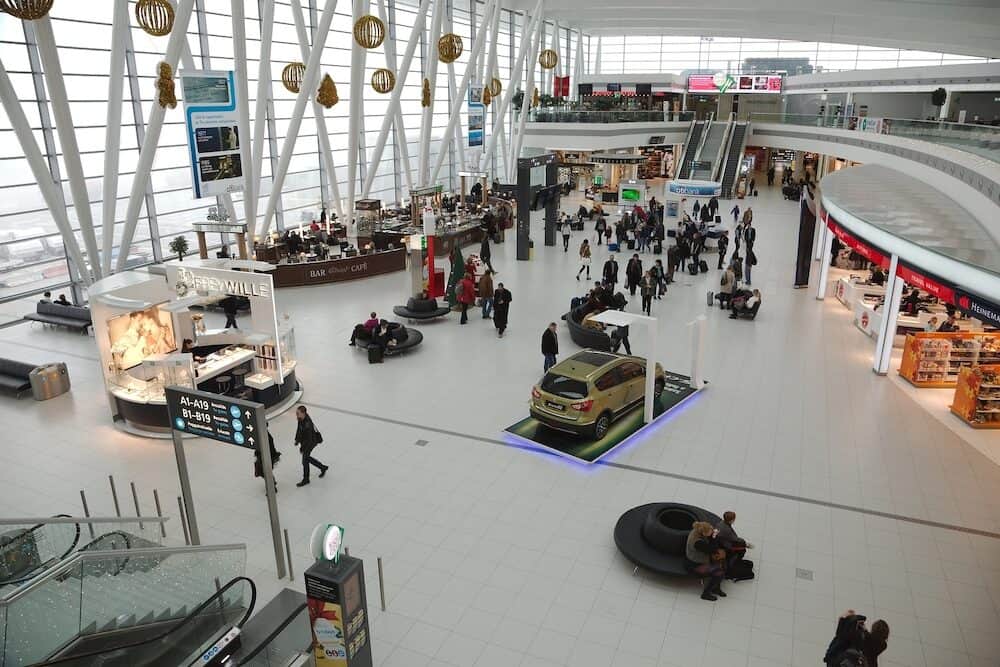
What to expect in Budapest
The main language spoken in Budapest is Hungarian. English is also spoken widely within the city, particularly among the younger generations, so you won’t have any issues trying to communicate.
Although Hungary is a member of the European Union, the country has not yet adopted the euro. The currency in use is forint, which comes in a range of colourful banknotes.
This may be confusing if you’ve been travelling around Europe before visiting Budapest, but don’t expect to be able to use your leftover euro. It’s not known when the forint will be phased out, but it will likely remain for the next few years.
It’s customary to tip between 10 and 15% at restaurants. Many establishments nowadays add a service charge to the final bill. Remember to check the total, as there’s no need to leave a tip if this charge has already been added.
Tipping at bars will depend on how fancy the place is, but 30 to 50 forints per drink is considered normal. Bellhops happily accept a 500 forint bill for bringing your luggage to your room, and housekeepers will greatly appreciate 200 to 300 forints for each night you’ve stayed.
How to get around Budapest
There are so many ways to get around Budapest, it’ll be hard to remember all your options! Fortunately, the city centre and historic districts are suitable for walking.
When your legs get tired, you’ll have your pick of public transportation. The underground metro system in Budapest is clean, reliable and fast, making it a good choice if you’re in a rush.
The city also has one of the largest tram networks in the world, and you’ll quickly see the charming yellow streetcars everywhere.
Even if you don’t need to go anywhere, looking out the window of a tram is a wonderful way to see Budapest. The number four and six routes are the most scenic and will take you past some of the city’s most stunning attractions.
Of course, there are plenty of buses too. City Tour and Budapest Circle Sightseeing both operate touristy hop on, hop off buses that run from Buda Castle to Heroes’ Square.
Before catching a train, tram, bus, or any other method of public transportation run by BKV, remember to buy your ticket! However, if you purchase a Budapest Card in advance, you’ll receive free and unlimited transportation (in addition to the other tourist benefits provided).
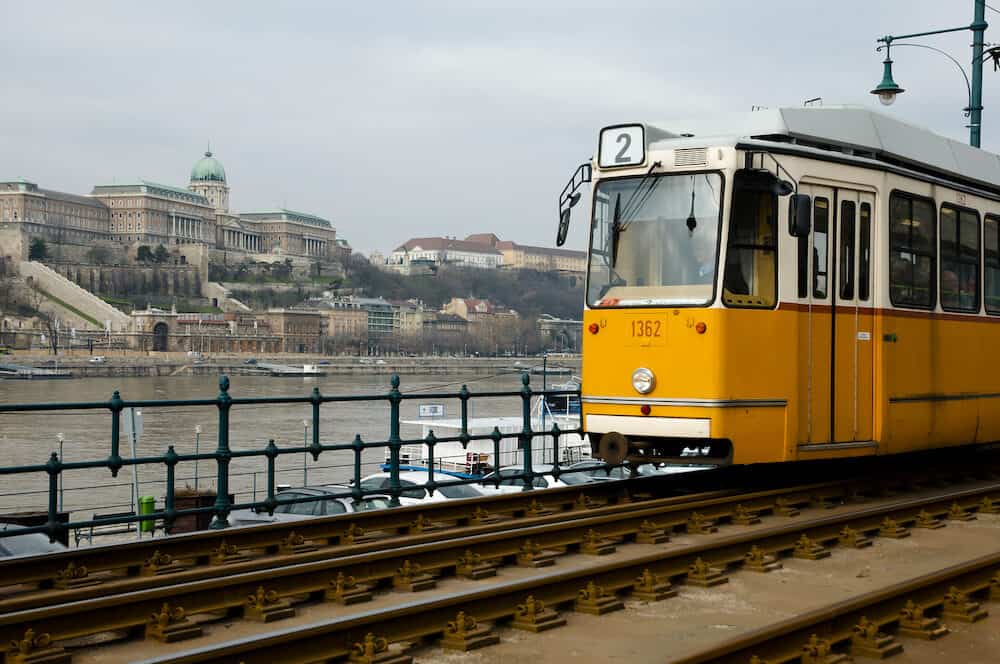
The best time to visit Budapest
Wondering when the best time to visit Budapest is? If you want to visit when the weather is nice and the crowds aren’t too packed, May, June, September and October are the perfect months.
The temperature during the middle of summer can reach 30 to 35°C, while the winter average is 0 to 4°C. The weather during the rest of the year is comfortable enough to explore the city and have an enjoyable trip.
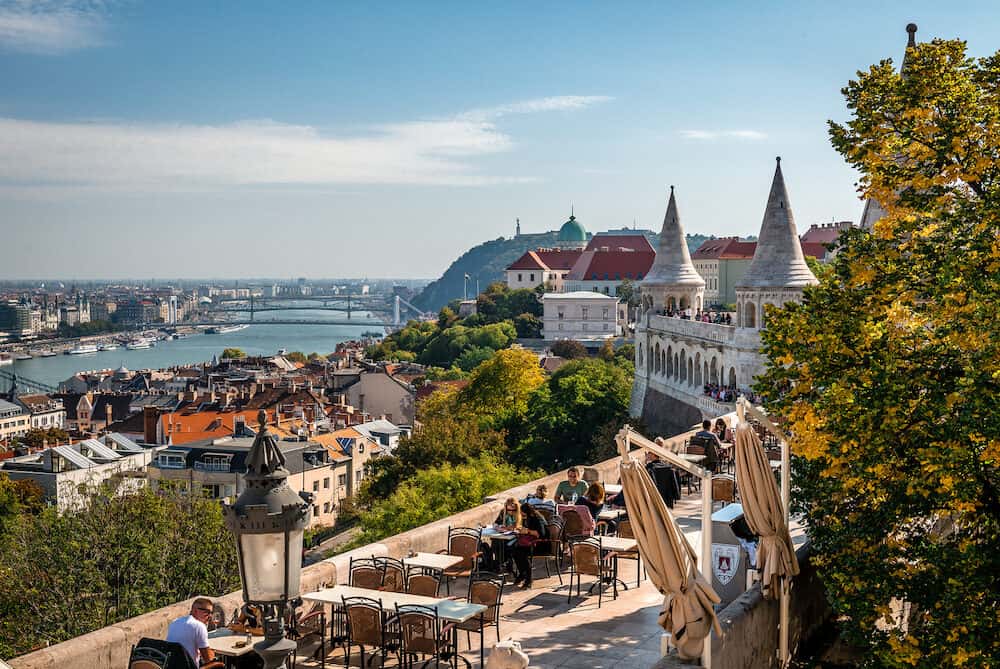
Things to do in Budapest
Soak in the thermal baths
Number one on your list of things to do in Budapest should be a soak in the thermal baths. No matter if it’s summer or winter, it’s an experience not to be missed. Budapest has the largest geothermal cave system in the world, and the city’s many thermal baths bring wonderful health benefits.
The Széchenyi Thermal Bath is one of the largest and most well-known medicinal baths in both Hungary and Europe. There are three large outdoor pools and 15 indoor baths, with water supplied by two thermal hot springs.
Hungarians and tourists of all walks of life come to swim, relax, socialise, and enjoy the healing properties of the baths. Széchenyi may be the most crowded, but it’s certainly the most iconic spot to go.
If you want a more private soak, try Király Baths. This thermal bath is found within a medieval complex that has been around since the 16th century. As it was built during the Ottoman rule, it’s more akin to a Turkish bath. The impressive and elegant domed ceiling adds to the serene experience.
Lukács Baths is another fantastic spot to go. Magic bath parties are held here on Saturday nights, complete with a DJ, a laser show and cocktails. Who says you can’t heal and party at the same time?
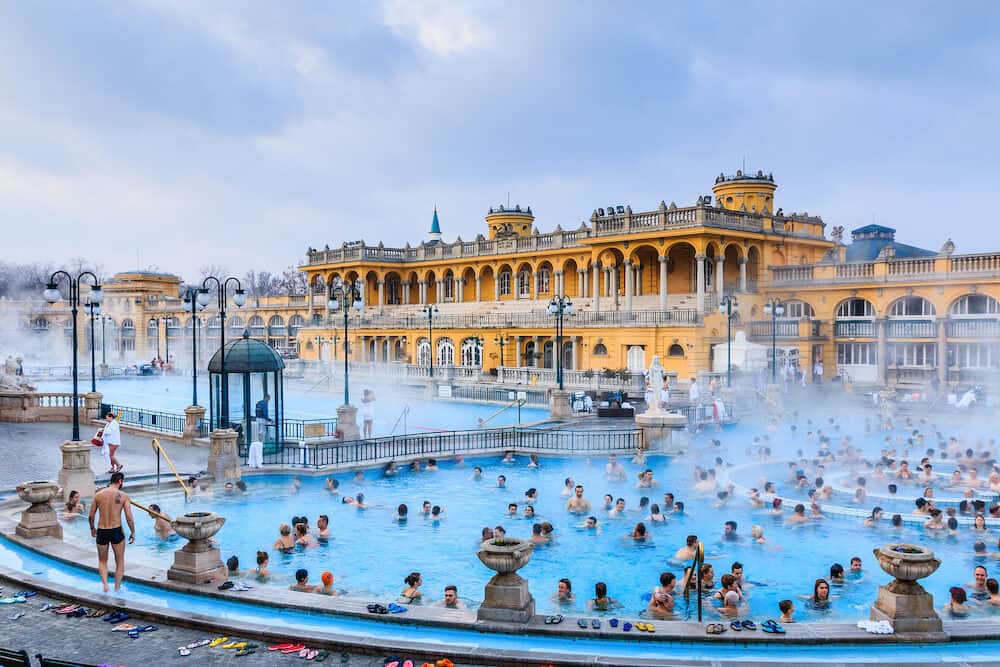
Go ruin bar-hopping
If you want to have a great night out, Budapest is the city for you. The Budapest nightlife scene is one of the best in Europe, thanks to a combination of affordability, diverse hotspots and world-class DJs.
What sets Budapest apart is the number of ruin bars. These romkocsmas, as they’re called in Hungarian, breathe new life into formerly abandoned buildings throughout District VII.
Szimpla Kert, an iconic ruin bar in Budapest, is one of the most unique and eclectic pubs you’ll ever go to. With a ton of mismatched bohemian furniture and decor, the ambience here is unmatched.
Yet, it’s more than just a cool place to have a few drinks and a fun evening out. Szimpla Kert lets non-profit organisations use the space in the mornings and focuses on giving young people opportunities to participate in civic life.
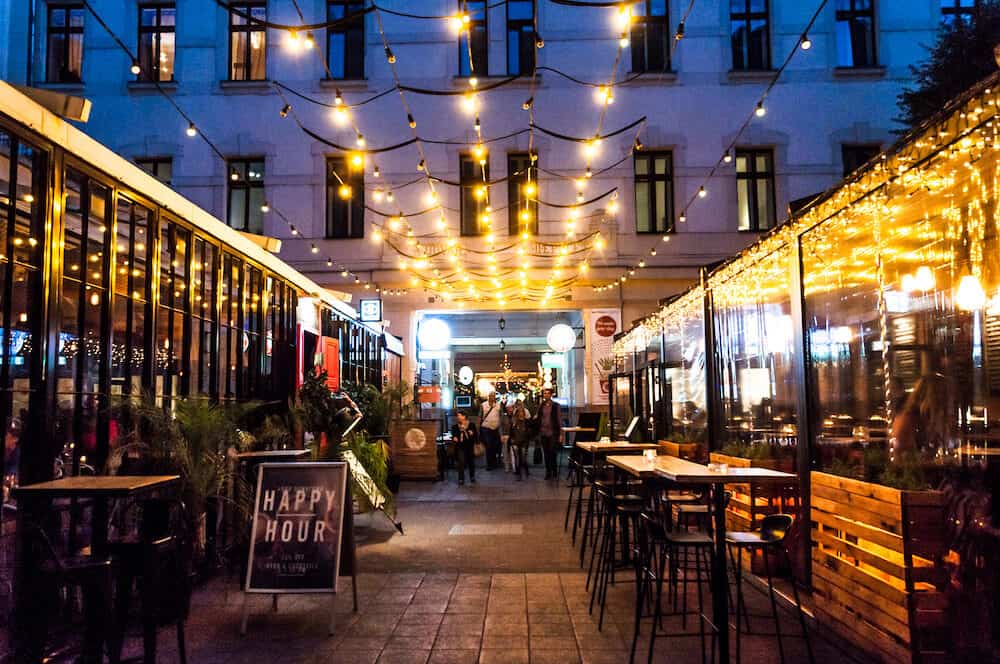
Visit the museums
Learn about Budapest’s interesting history at many of the city’s fascinating museums. The ultimate place to go is, of course, the Hungarian National Museum.
While the building itself is worth the trip alone, you’ll also discover detailed exhibits and well-preserved historical relics.
The Museum of Fine Arts in Heroes’ Square and the Hungarian National Gallery on Castle Hill are the places to go to see some remarkable historic artwork.
The neoclassical Fine Arts building holds paintings from Hungarian artist Victor Vasarely, while the National Gallery has works by renowned painter Mihály Munkácsy.
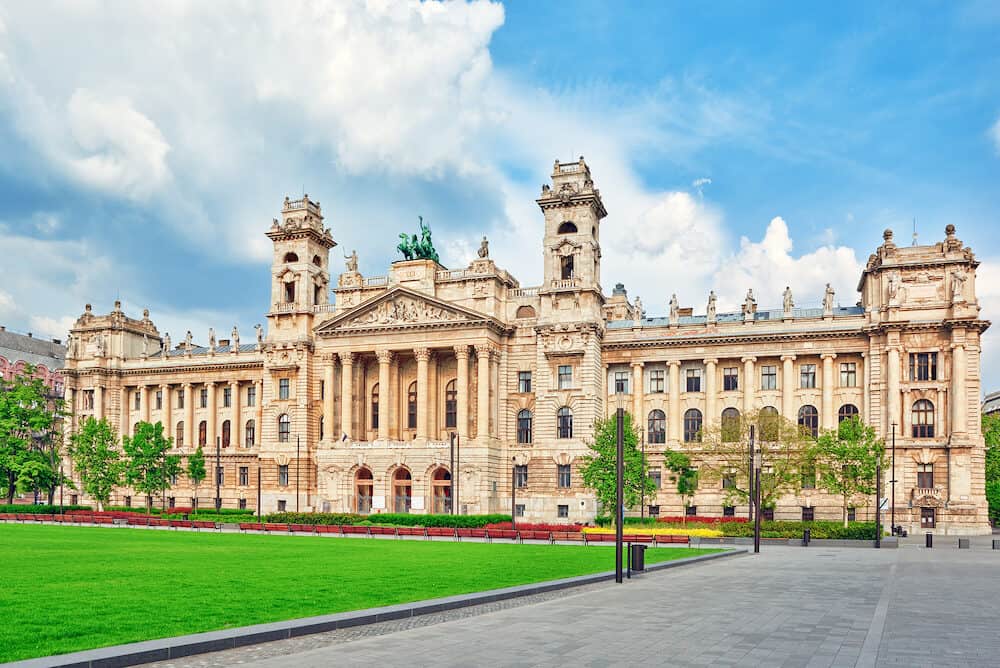
Places to visit in Budapest
With so many attractions so close to one another, you can visit many places even when you only have limited time in the city. Here’s what to see in Budapest in one day.
Buda Castle
The magnificent, historic castle and palace known as Buda Castle is a must see in Budapest. It’s a place of tremendous history and opulence, and the castle is listed as a UNESCO World Heritage Site.
While construction of the castle was first completed in 1265, the Baroque-style palace was built over 20 years during the mid-1700s. With over 200 rooms and numerous monuments throughout the gardens, you could easily spend half the day here.
As the site sits atop a hill on the Buda side of the city, the best way to get there is to take the funicular near Adam Clark Square.
Waiting in line can sometimes take up to half an hour, so you can walk to the top of the hill yourself if you’d prefer. It’s free to wander the grounds and admire the exteriors, but you’ll have to pay an admission fee to get inside the castle.
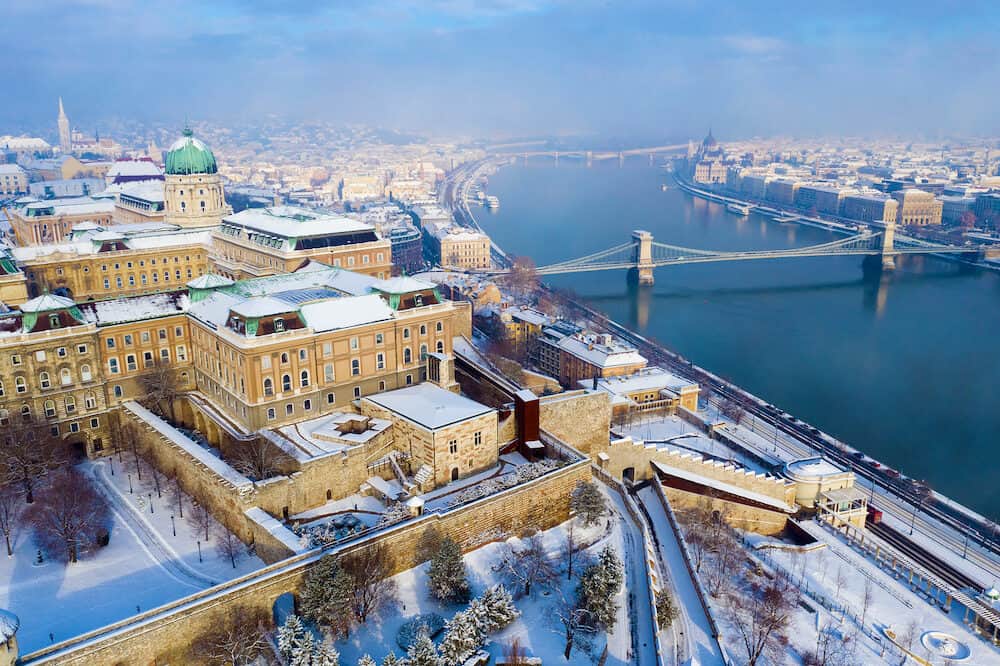
Chain Bridge
With Budapest separated in two by the Danube River, the Széchenyi Chain Bridge brings the western and eastern sides together.
The areas of Buda and Pest were connected in 1849, with the bridge becoming a symbol of unity and national advancement for Hungary. Spanning over 200 metres, the bridge is guarded on both sides by large lion structures made from stone.
Take a walk across the bridge in the evening to see the remarkable views and marvel at the architecture. It won’t take long for you to understand what all the fuss is about!
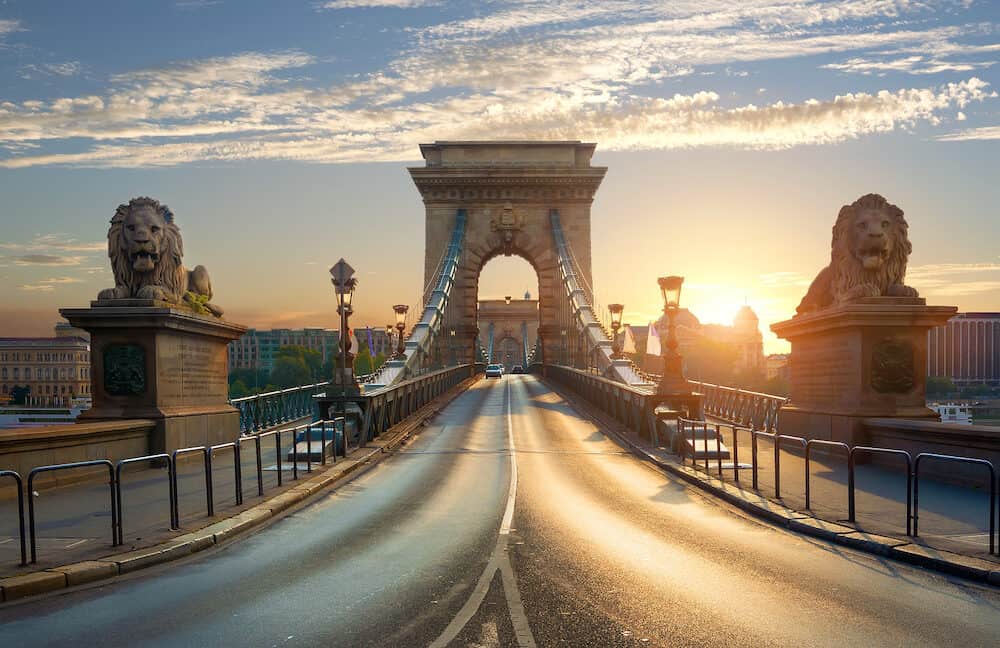
Fisherman’s Bastion
While you’ll undoubtedly be admiring the city at every turn, the place to go for exceptional views of Budapest is Fisherman’s Bastion.
This neo-Romanesque, neo-Gothic style terrace is easily identified by its seven fairytale-like towers.
You’re sure to be left speechless looking out at the beauty of the Danube River during sunset. Sitting atop Castle Hill, it’s a short walk from Buda Castle and is completely free to wander around.
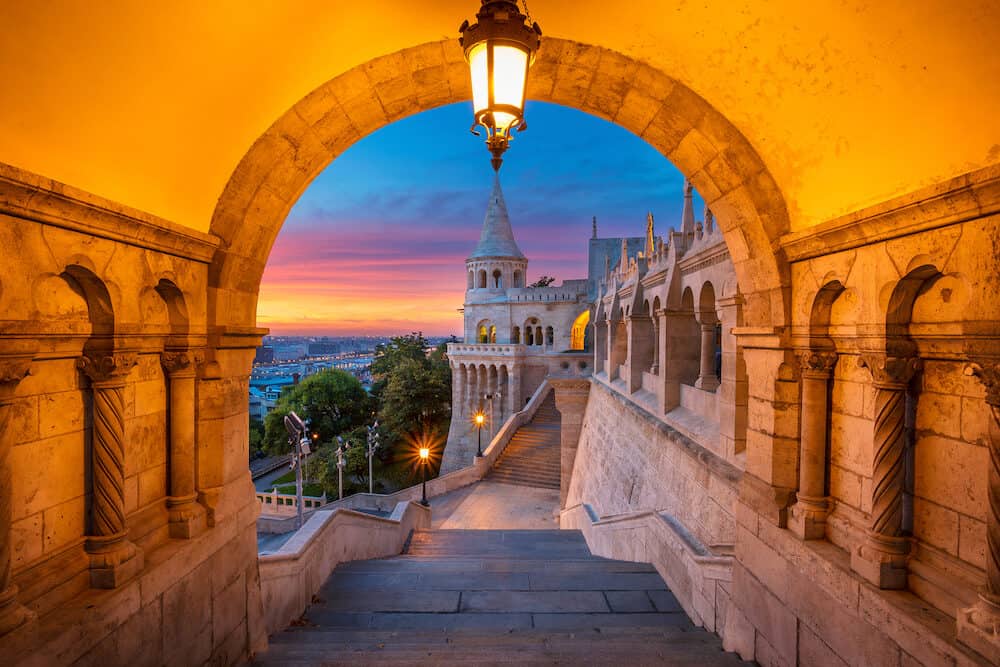
What to eat in Budapest
One of the best things about travelling is getting to eat like a local. Hungarian cuisine has a ton of delicious dishes you’d be crazy not to try. Here are a few quick suggestions of what to look for on the menu:
- Goulash: A rich stew made with vegetables and beef, and Hungary’s national dish
- Chicken paprikash: A hearty chicken dish made with a lot of paprika and traditionally served with egg dumplings
- Fisherman’s soup: A spicy traditional soup with fish caught from the Danube River
- Lecsó: A seasoned vegetable stew with tomatoes, yellow capsicum and onions, and one of the few traditional vegetarian dishes
- Töltött káposzta: The comfort food of the Hungarian people, consisting of meat and rice stuffed into large cabbage leaves
- Kürtőskalács: A hollow pastry and a popular street food snack, also known as a chimney cake in English
- Gyümölcsleves: A pretty pink fruit soup made using sour cream, cherries and sugar
- Gundel palacsinta: Hungary’s answer to crepes, filled with walnuts and raisins, then doused in dark chocolate sauce
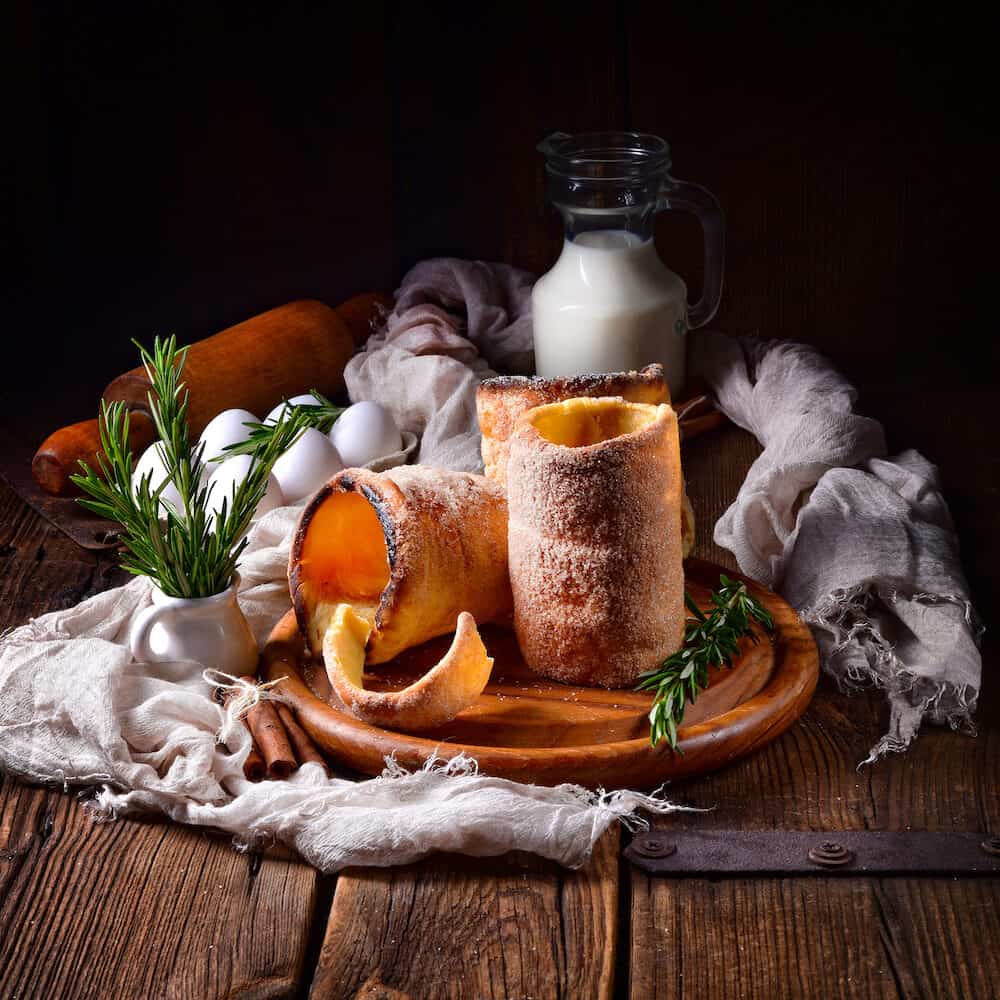
Where to stay in Budapest
Budapest is an affordable city, so you can stay in top-notch hotels without breaking the bank.
If you’re travelling with your family or a group of friends and want Budapest to feel like home, look no further than Trendy Deluxe Apartments on the Pest side. The rooms are modern, clean, and come with a fully-equipped kitchen.
The building is in an unbeatable location in District VI, right between the Bajcsy-Zsilinszky út and Deák Ferenc tér metro stations. It’s walking distance from everything you’ll need, and only 600 metres from the Hungarian State Opera.
While most accommodation is within Pest, there are still some great places to stay on the Buda side of the city. Budget Hotel Victoria is stylish, welcoming, and offers charming courtyard views from every room.
Guests are served a tasty breakfast before beginning a busy day of sightseeing, as well as complimentary afternoon tea. The hotel is only 500 metres from the Chain Bridge and the Castle Hill Funicular, so you’ll never have to walk too far to see Budapest’s best attractions.

Tours to do in Budapest
Want to be guided around some of Budapest’s most magnificent attractions?
Take a guided tour of the astonishing Hungarian Parliament Building. This neo-Gothic architectural wonder is the third largest parliament building in the world and the largest building in Hungary. Explore the impressive interiors while listening to commentary about the history of Budapest.
If you’re a foodie, you should definitely consider the Market Hall Tour and Cooking Class. The Central Market Hall is the ultimate place to experience what Budapest’s local cuisine is all about.
Following the market tour and optional breakfast, your cooking instructor will teach you how to prepare a three-course meal of your choosing.
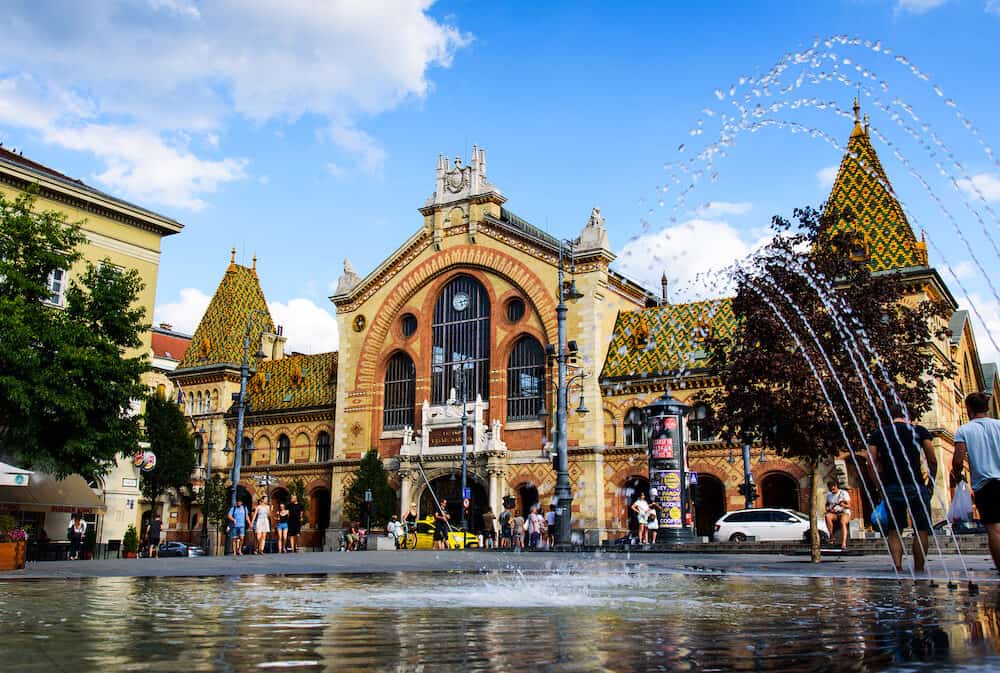
Day trips from Budapest
If you want to get out of the city for the day, head out to Hungary’s wine region. A four-hour tour of Etyek will take you wine tasting at three family-run wineries, followed by a traditional Hungarian dinner. This tour provides a wonderful opportunity to get to know the people living in Hungarian villages.
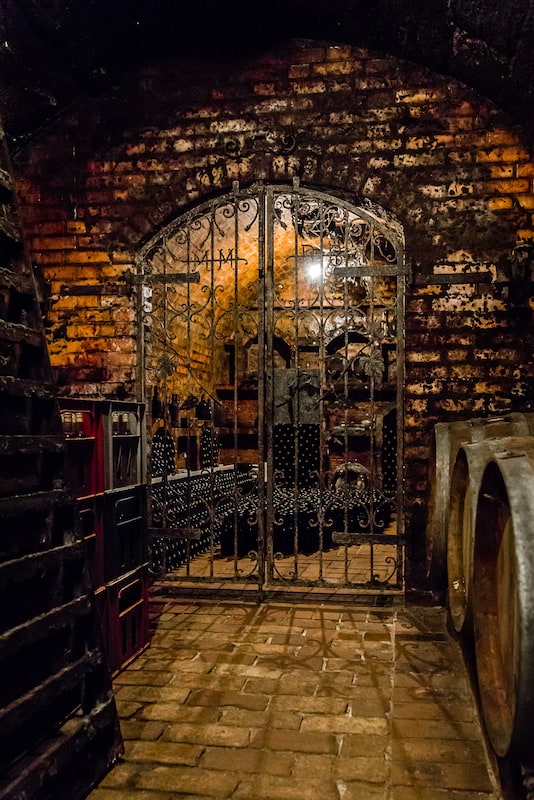
Recommend budget tours in Budapest
- Budapest Danube River Cruise with Optional Dinner
- Private Entrance to Széchenyi Spa in Budapest with Optional Massage
- Budapest Evening Sightseeing Cruise
- Private Luxury Sightseeing Tour Of Budapest
- Budapest Segway Sightseeing Tour
- Budapest Airport Private Arrival Transfer
- Etyek Wine Country Tour with Dinner from Budapest
- Budapest Bike Tour
- Budapest Food Walking Tour
- Small-Group Budapest Caving Adventure
- Budapest Hammer & Sickle Tour – Communist Times, 56 Revolution, WW I and WW II
- Budapest Private Tuk Tuk Tour
- Budapest Castle District Walking Tour Including Fisherman’s Bastion
Read more on Budapest:
- 48 hours in Budapest
- 3 Days in Budapest Itinerary
- Best Day Trips from Budapest
- Budget Guide to Budapest
If you’d like to save it for later, please save it to Pinterest.
